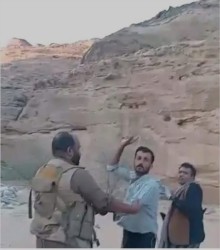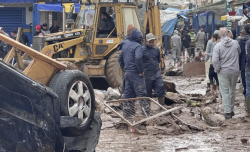Iranian boats 'tried to intercept British tanker'
- 2019-07-11 14:32:29


 Pierre Rayer: Art, Science, and Happiness: The Universal Mission of Transmission to Future Generations through Patronage at the Louvre Abu Dhabi
Pierre Rayer: Art, Science, and Happiness: The Universal Mission of Transmission to Future Generations through Patronage at the Louvre Abu Dhabi Ahly crowned Super champions after dramatic extra-time win over Modern Future FC
Ahly crowned Super champions after dramatic extra-time win over Modern Future FC Yemeni Honey..A Development Wealth Threatened By Conflict And Climate Change
Yemeni Honey..A Development Wealth Threatened By Conflict And Climate Change California wildfires: Millions warned of possible power cut
California wildfires: Millions warned of possible power cut Central African rebels launch attacks near capital
Central African rebels launch attacks near capital ACJ Condemns Extrajudicial Execution in Shabwa, Yemen
ACJ Condemns Extrajudicial Execution in Shabwa, Yemen Morocco Advance to the FIFA Arab Cup Final With Win Over the United Arab Emirates
Morocco Advance to the FIFA Arab Cup Final With Win Over the United Arab Emirates PM Netanyahu Meets with US Ambassador to Turkey and Special Envoy to Syria Tom Barrack
PM Netanyahu Meets with US Ambassador to Turkey and Special Envoy to Syria Tom Barrack Death toll from floods rises to 37 in western Morocco
Death toll from floods rises to 37 in western Morocco AD Ports to launch tender offer for majority stake in Alexandria Container Handling
AD Ports to launch tender offer for majority stake in Alexandria Container Handling
